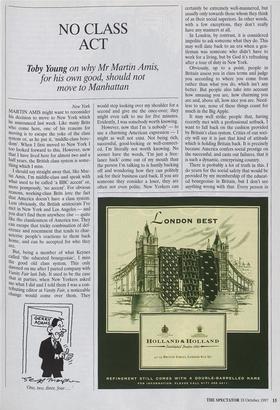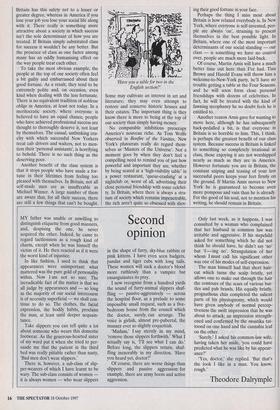NO CLASS ACT
Toby Young on why Mr Martin Am is,
for his own good, should not move to Manhattan
New York MARTIN AMIS might want to reconsider his decision to move to New York which he announced last week. Like many Brits who come here, one of his reasons for moving is to escape the yoke of the class system or, as he put it, 'middle-class bore- dom'. When I first moved to New York I too looked forward to this. However, now that I have lived here for almost two and a half years, the British class system is some- thing which I miss.
I should say straight away that, like Mar- tin Amis, I'm middle-class and speak with What used to be called 'a BBC accent' or, more pompously, 'no accent'. For obvious reasons, working-class Brits love the fact that America doesn't have a class system. Less obviously, the British aristocrats I've met in New York and Los Angeles — and You don't find them anywhere else — quite hke the classlessness of America too. They can escape that tricky combination of def- erence and resentment that tends to char- acterise people's reactions to them back home, and can be accepted for who they are.
But, being a member of what Keynes called 'the educated bourgeoisie', I miss the good old class system. This only dawned on me after I parted company with Vanity Fair last July. It used to be the case that at parties, when New Yorkers asked me what I did and I told them I was a con- tributing editor at Vanity Fair, a noticeable Change would come over them. They 'One, two, three, four . . ' would stop looking over my shoulder for a second and give me the once-over; they might even talk to me for five minutes. Evidently. I was somebody worth knowing.
However, now that I'm 'a nobody' — to use a charming American expression — I might as well not exist. Not being rich, successful, good-looking or well-connect- ed, I'm literally not worth knowing. No sooner have the words, 'I'm just a free- lance hack' come out of my mouth than the person I'm talking to is hastily backing off and wondering how they can politely ask for their business card back. If you are someone they consider a loser, they are often not even polite. New Yorkers can certainly be extremely well-mannered, but usually only towards those whom they think of as their social superiors. In other words, with a few exceptions, they don't really have any manners at all.
In London, by contrast, it is considered impolite to ask someone what they do. This may well date back to an era when a gen- tleman was someone who didn't have to work for a living, but by God it's refreshing after a tour of duty in New York.
Obviously, up to a point, people in Britain assess you in class terms and judge you according to where you come from rather than what you do, which isn't any better. But people also take into account how amusing you are, how charming you are and, above all, how nice you are. Need- less to say, none of these things count for much in the Big Apple.
It may well strike people that, having recently met with a professional setback, I want to fall back on the cushion provided by Britain's class system. Critics of our soci- ety will say it is just that kind of attitude which is holding Britain back. It is precisely because America confers social prestige on the successful, and casts out failures, that it is such a dynamic, enterprising country.
There is probably a lot of truth in this. I do yearn for the social safety that would be provided by my membership of the educat- ed bourgeoisie in Britain, but I don't see anything wrong with that. Every person in Britain has this safety net to a lesser or greater degree, whereas in America if you lose your job you lose your social life along with it. There really is something more attractive about a society in which success isn't the sole determinant of how you are treated. If Britain simply substituted class for success it wouldn't be any better. But the presence of class as one factor among many has an oddly humanising effect on the way people treat each other.
To take the most obvious example, the people at the top of our society often feel a bit guilty and embarrassed about their good fortune. As a result, they tend to be extremely polite and, on occasion, even kind when dealing with the less fortunate. There is no equivalent tradition of noblesse oblige in America, at least not today. In a meritocratic society, where everyone is believed to have an equal chance, people who have achieved professional success are thought to thoroughly deserve it, not least by themselves. The casual, unthinking cru- elty with which successful New Yorkers treat cab drivers and waiters, not to men- tion their 'personal assistants', is horrifying to behold. There is no such thing as the deserving poor.
Another benefit of the class system is that it stops people who have made a for- tune in their lifetimes from feeling too pleased with themselves. In Britain, not all self-made men are as insufferable as Michael Winner. A large number of them are aware that, for all their success, there are still a few things that can't be bought. 'Have you a table for two in the English section?'
Some may cultivate an interest in art and literature; they may even attempt to restore and conserve historic houses and their estates. The important thing is they know there is more to being at the top of our society than simply having money.
No comparable inhibitions preoccupy America's nouveau riche. As Tom Wolfe observed in Bonfire of the Vanities, New York's plutocrats really do regard them- selves as 'Masters of the Universe'. Not a moment goes by when they don't feel a compelling need to remind you of just how powerful and important they are, whether by being seated at a 'high-visibility table' in a power restaurant, 'queue-crashing' at a nightclub or, worst of all, advertising their close personal friendship with some celebri- ty. In Britain, where there is always a stra- tum of society which remains impenetrable, the rich aren't quite so obsessed with shov- ing their good fortune in your face.
Perhaps the thing I miss most about Britain is how relaxed everybody is. In New York, where everyone is self-invented, peo- ple are always 'on', straining to present themselves in the best possible light. In Britain, where one of the most important determinants of our social standing — our class — is something we have no control over, people are much more laid-back.
Of course, Martin Amis will have a much better time out here than I've had. Tina Brown and Harold Evans will throw him a welcome-to-New-York party, he'll have no trouble getting a table at the Four Seasons, and he will soon form close personal friendships with dozens of celebrities. In fact, he will be treated with the kind of fawning sycophancy he no doubt feels he is entitled to.
Another reason Amis gave for wanting to move here, although he has subsequently back-pedalled a bit, is that everyone in Britain is so horrible to him. This, I think, is perhaps the greatest benefit of our class system. Because success in Britain is linked to something so completely irrational as class, those enjoying it are not worshipped nearly as much as they are in America. However fortunate you are in Britain, the constant sniping and teasing of your less successful peers keeps your feet firmly on the ground. If Martin Amis moves to New York he is guaranteed to become even more pompous and vain than he is already. For the good of his soul, not to mention his writing, he should remain in Britain.



























































































 Previous page
Previous page